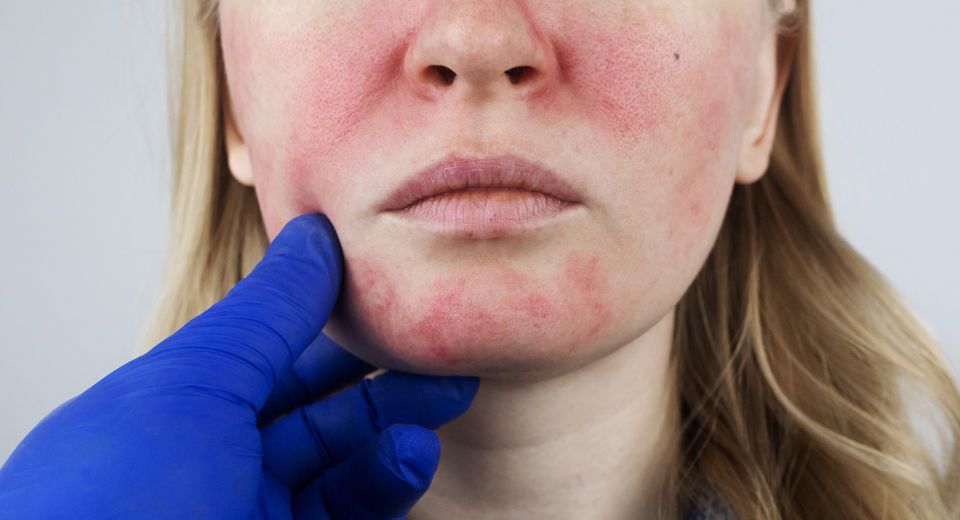
Author: Bree Maloney, Manager
Rosacea (pronounced roe-ZAY-she-uh) is a common, incurable skin condition that causes reddened skin and a rash, usually on the cheeks and nose. The condition can make your skin look flushed or frequently blushing. Because rosacea has so many signs and symptoms, scientists created 4 subtypes of rosacea. Some people have more than one rosacea subtype at the same time. Each subtype requires different treatment.
Facial Redness, Flushing, Visible Blood Vessels
Signs and symptoms
- Flushing and redness in the center of the face
- Visible broken blood vessels (spider veins)
- Swollen skin
- Skin may be very sensitive
- Skin may sting and burn
- Dry skin, roughness or scaling
- Have a tendency to flush or blush more easily than other people
Acne-like Breakouts: Most Common in Middle-aged Women
Signs and symptoms
- Acne-like breakouts, usually where the skin is very red
- Acne-like breakouts tend to come and go
- Oily skin
- Skin may be very sensitive
- Skin may burn and sting
- Visible broken blood vessels (spider veins)
- Raised patches of skin called plaques
Thickening of the Skin
This type is rare. When it does occur, the person often has signs and symptoms of another subtype of rosacea first.
- Bumpy texture to the skin
- Skin begins to thicken, especially common on the nose. When the skin thickens on the nose, it is called rhinophyma (rye-NO-fie-ma)
- Skin may thicken on the chin, forehead, cheeks, and ears
- Visible broken blood vessels appear
- Pores look large
- Oily skin
Ocular Rosacea
Some people get rosacea in their eyes. The eyes may have one or more of the following:
- Watery or bloodshot appearance
- Feel gritty, often feels like sand in the eyes
- Eyes burn or sting
- Eyes are very dry
- Eyes itch
- Eyes sensitive to light
- Blurry vision
- Visible broken blood vessels on an eyelid
- Cyst on the eyelid
- Person cannot see as well as before
Rosacea Can Affect Quality of Life
Rosacea can affect more than the skin and eyes. Because rosacea is a chronic (long-lasting) skin disease, it can reduce a person’s quality of life. Many people report problems at work, in their marriage, and with meeting new people. Surveys and studies report that living with rosacea can cause:
- Feelings of frustration and embarrassment: In surveys conducted by the National Rosacea Society, 41 percent said their rosacea caused them to avoid public contact or cancel social engagements.
- Worry: People worry that their rosacea will get worse or cause scars. People worry about side effects from medicine used to treat rosacea.
- Low self-esteem: Surveys conducted by the National Rosacea Society found that almost 70 percent of people living with rosacea said that the condition lowered their self-confidence and self-esteem.
- Work-related problems: Surveys conducted by the National Rosacea Society find that when rosacea is severe, 70 percent of people say the disease affects their interactions at work. Nearly 30 percent say that rosacea causes them to miss work.
- Anxiety and depression: Living with a skin condition that flares unexpectedly can cause people to believe you have a drinking problem. This can cause anxiety and depression.
Treatment seems to improve a person’s quality of life. Studies show that when people have fewer signs and symptoms of rosacea, their quality of life improves.
Causes of Rosacea
Though the cause is unknown, it could be hereditary, an overactive immune system, environmental or a combination of some. It is not contagious and not a result of poor hygiene.
Flare-ups might be triggered by:
- Hot drinks and spicy foods
- Red wine and other alcoholic beverages
- Temperature extremes
- Sun or wind
- Emotions
- Exercise
- Drugs that dilate blood vessels, including some blood pressure medications
- Some cosmetic, skin or hair care products
The information provided is for general interest only and should not be misconstrued as a diagnosis, prognosis, or treatment recommendation. This information does not in any way constitute the practice of medicine, or any other health care profession. Readers are directed to consult their health care provider regarding their specific health situation. Marque Medical is not liable for any action taken by a reader based upon this information.

